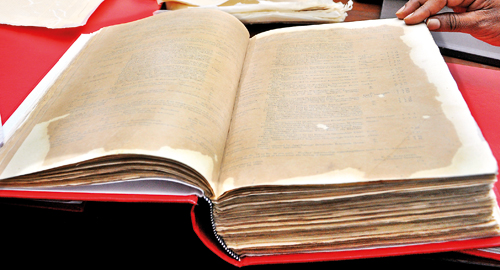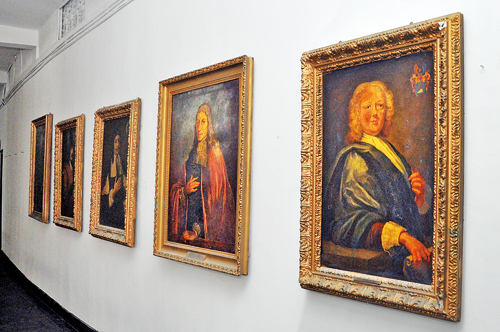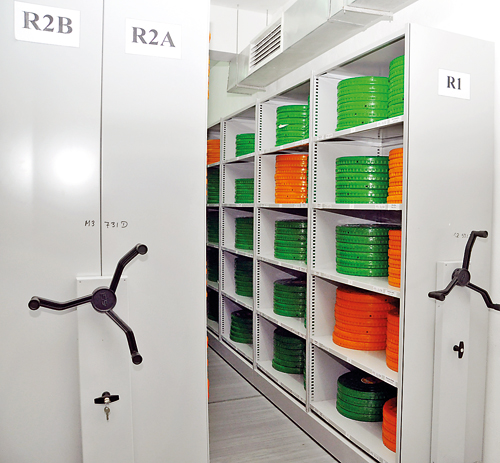Story of storing: Finding space to state-of-the-art
 Journalists and the public alike rejoiced at the enactment of the 2016 Right to Information Act in Sri Lanka – legislation which seemingly heralded a new age of government transparency in the island. However, government departments were less enthusiastic. It is not the access the general public has to government records that has them in a quandary but the actual physical storage of said records. In most government departments the desperate scramble to find the space somewhere to store documents has created a very big dilemma indeed.
Journalists and the public alike rejoiced at the enactment of the 2016 Right to Information Act in Sri Lanka – legislation which seemingly heralded a new age of government transparency in the island. However, government departments were less enthusiastic. It is not the access the general public has to government records that has them in a quandary but the actual physical storage of said records. In most government departments the desperate scramble to find the space somewhere to store documents has created a very big dilemma indeed.
A two-day conference on ‘Managing Municipal Archives’ hosted by the Department of National Archives and co-sponsored by the International Council on Archives (ICA) held in August helped throw up possible solutions. This seminar on record management was attended by senior officials from Municipal Councils, Urban Councils and Pradeshiya Sabhas. Conducted by experienced international archivists Dr. Bart Ballaux and Laura Taylor, it focused on what needs to be done.
The Municipal Councils, established in the 19th century during British rule, were aimed at efficient local administration and through them the maintenance of roads, public health services, market facilities etc. were provided. Records of these councils are deposited within the Department of National Archives, while the councils themselves also maintain their own records. A situation where these records are maintained in pristine condition and easily accessible is an ideal which most Sri Lankans would know is far from the reality of what actually takes place.

Dr. Bart Ballaux
There are several reasons why the task of storing documents has become so difficult, we learn. The first is the overall lack of a proper record storing system within government departments and the second is what seems to be a lack within the Right to Information Act itself. Section 7 (3) of the Act states that documents created before the enactment of the statute need to be kept for 10 years and documents created after for 12 – a great idea in theory but impractical in execution. Both Dr. Ballaux and Taylor, from the City of Rotterdam and the London Metropolitan Archives respectively, use retention schedules – a schedule which helps determine which documents are kept for how long (and if at all) so that only documents of importance are carefully stored away.
An update of the Archival Law in Sri Lanka should help in this aspect because it would allow for the Department of National Archives to create retention schedules and thereby ensure that documents of little to no importance are treated accordingly. While emphasising the importance of maintaining a retention schedule, the seminar also stressed on easier means of archival management such as the simple act of effectively storing documents from the time they are made in order for the process of storing records (some of which might even become archives later on) to be more effective.

Dr. Nadeera Rupesinghe
There should be little distinction made between record and archive management, explains Director General of Sri Lankan Archives Dr. Nadeera Rupesinghe. Record management is what takes place at the government department which creates the document while archival management takes place when the records are handed over to a department of archives. One reason for the improper storage of records in government departments could possibly be the lack of staff. Many of the officials in charge of record keeping serve many other roles besides and when record management competes with many other vital tasks that require one individual’s attention, the records suffer.
Semantics aside, record and archival management is essential for good governance. The important role played by archives in a nation cannot be downplayed. In Sri Lanka, archival storage is an ancient practice as old as the early Anuradhapura Kingdom (with an officer in charge of Royal Archives) and has been carried out throughout the changing times – from the ancient kingdoms to the periods of colonization. Large parts of Sri Lanka’s archival history were lost when the Portuguese destroyed archives before the country was taken over by the Dutch but also when the Kings did the same whenever there was a threat of invasion.

Laura Taylor
Modern day archives serve a rather different purpose to archives at their inception. What used to be a means for governments to keep track of official business through their records has now become a channel of transparency and democracy. Most (if not all) archives around the globe have free entrance, and most now also have digitized part of their collections, with most archivists having to deal with the implications of freedom of information acts which are increasingly being passed in nations.
In the UK, the Freedom of Information Act 2000 was dealt with by UK archivists who collectively implemented a methodology to ensure the daily workings of archive and record rooms could facilitate requests for such information. Taylor and Dr. Ballaux feel that the International Council on Archives is a great resource for archivists faced with the problem of Freedom of Information legislation because so many countries have already developed or are in the process of developing ways of coping with the daily demand such legislation creates. Dr. Ballaux feels that this is just the beginning of the revolution of freely available information.
Speaking to Dr. Ballaux and Taylor, it is clear that the Right to Information Act and the challenges it has brought Sri Lankan archivists is nothing strange – it has happened in every nation where similar legislation was brought about. To put it simply, the best solution for this dilemma is the proper storage and maintenance of records and archives, although a two day glimpse into the world of archivists serves to prove just how complex and vital a task this really is.
Explaining that archives have evolved from their early days in around the 19th century B.C. where only rich people had access, Dr. Ballaux highlights a recent proposal by the Dutch government as a possible evolution of archives in future. “There was a political proposal to release every document online 14 days after it’s created,” he explains, adding that such legislation would cost billions to implement, although he hopes for a future where even such progressive legislation is possible. He also explains that right now, freedom of information follows an ‘ask and receive’ policy but hopes that this too will change to a future where everything is readily available for people to see without having to request for it.
The digital age has also had its own implications for record and archival management. Where documents were handwritten and simply preserved as they were created, documents soon started being printed and were still preserved as they were found but official documents are often never printed in this modern era where documents can be viewed anywhere via a smart phone or a host of other electronic devices. This creates confusion for archivists – should the documents created on a computer be printed and archived or stored digitally? The simple answer for this question is yes – they should indeed be stored digitally.
But, nothing is ever so simple. Creating digital archives is an entirely new system very different from the task of creating physical documents and it has a new set of problems. One of the biggest problems is creating enough back-up servers to ensure that all of the information is preserved. Another issue is funding – creating an entirely new system vastly different from paper records costs. A third issue is constantly updating the format of the documents in a fast evolving digital age. “Right now we use PDFs, but what happens a century from now if that format is never used anymore?” questions Dr. Rupesinghe, citing the example of floppy disks, CDs etc which are now used less as pen drives and memory chips etc become more commonplace.
Funding is an issue even for Ballaux and Taylor, who are continually working with their colleagues back home to improve their archives. Ballaux comments on the drastic difference in the budget allocated in the Netherlands and that of Sri Lanka. “The budget that we have in the city of Rotterdam for just the building alone is 6 million euros – if they had that budget here the entire building would look like the film archive,” he states. Both highly commend the work done by Dr. Rupesinghe and her staff.
With the requirements created by Freedom of Information acts to the storage of documents manually or electronically etc., the demand for qualified archivists is increasing. Dr. Ballaux is happy to note that the need for qualified archivists is being recognized more now. Unfortunately, Sri Lankan universities offer no diploma or Master’s programmes in Record and Archival Management (the global trend is to offer a Masters rather than a Bachelor’s degree), although Dr. Rupasinghe hopes that this will change in the future.
Dr. Rupesinghe has a great vision on how to improve the services at the Department of National Archives, which she lists out with enthusiasm – the improvements which have already been made (getting the staff recruitment schemes completed, approval of almost Rs. 1 billion for the renovation of the main building for creating the optimum environmental conditions for archival storage) a testament to her abilities. Above all, standards of the Department of National Archives should be maintained, she feels. “A high level of discipline must be maintained by the Department in order to ensure the integrity and safety of the archives,” she states firmly.
| Is London Bridge safe? Finding answers in past records Most people would be familiar with the popular nursery rhyme ‘London Bridge is falling down’, but what happens when it is unclear whether London Bridge is in fact falling down? Should one simply wait and see what happens? Luckily the London Metropolitan Archives provided information which prevented such a dilemma recently. “Somebody in our reading rooms asked me for the plans of one of our London Bridges the other day because he needed really specific information about the construction of that bridge to see if it was safe and if that record hadn’t been preserved, how do they know it’s still a safe bridge?” Taylor asks. However, not everyone uses the wealth of information provided by their local archives. “It’s true that not a lot of people are aware of it,” admits Ballaux, although Taylor feels an increasing number of people are becoming more aware – a positive indication that more people will start using the wealth of information available at their local archives. | |
| The Department of National Archives: A treasure trove of information | |
 Governors’ Gallery: A row of paintings by a unknown artist. Pix by Priyantha Wickramaarchchi With repositories for documents spanning 22km, a conservation department and a state of the art search room and film repositories, there are many things of interest at the Department of National Archives. A series of paintings of the governors of Ceylon from Dutch times by an unknown artist, line the first floor of the old building, raising more questions than answers -how the artist knew what all of the governors painted actually looked like; the nationality of the artist, his/her reason for painting all of these portraits etc.. The collection of ‘Thombos’ from Dutch rule in coastal Sri Lanka are also of particular interest. Detailing the land ownership of that time, it also gives out many other interesting historical details which are a valuable glimpse into days long gone. Thombos have also served a very valuable purpose both now and at the time of their creating – settling many land disputes and in fact they are still taken to court today. |
| High-tech reel storage | |
 The National Film, Television and Sound Archives: Commended by Bart Ballaux and Laura Taylor The National Film, Television and Sound Archives built in 2014 (housed with the Department of National Archives in the new extension building built in 2012) highly commended by Bart Ballaux and Laura Taylor, is every bit state of the art as one would expect. With mobile racks imported from Germany, the repository has the optimum environmental conditions for storage. There are over 300 feature films from the 1950s onwards stored there. In an ongoing project, 237 feature films have already been digitized. The feature films have been given to the department by the National Film Corporation and requests by producers to loan the films are handled by the National Film Corporation. Selected audiovisual records can be taken and listened to by the general public at the premises, and there are also facilities available for them to be copied.
|
| Talking archival management | |
| Should anyone unfamiliar with the field of archival management have wondered if the seminar was conducted in English or another language entirely, they could be forgiven. With discussions on niche topics such as ‘metadata classification and appraisal in an electronic environment’ and ‘paper records management at London Metropolitan Archives and creating retention schedules’, the subject matter discussed and the terms used were very specific indeed. While Ballaux focused on the creation and management of an electronic archival system, Taylor spoke about the maintenance and storage of physical archives. Technical terms apart, everything was explained in a very simple and straightforward manner – a fact which many participants were happy to note. One of the main suggestions made by both experts was that work should be done very thoroughly at the start – electronic files created systematically and named and sorted properly at the time they are made and physical files sorted and stored in properly labelled boxes etc. The need for well trained staff and the proper delegation of tasks etc, was stressed on by Ballaux, while Taylor spoke about the importance of keeping only the records which are necessary etc. Both felt that completing tasks well at the start could prevent much chaos in future. |


